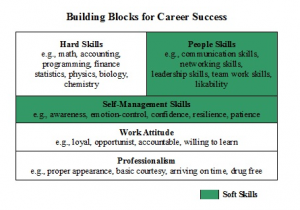by Charles Plant | May 15, 2012 | Management
Dan McCarthy has written an excellent blog on the 6 passages of leadership and management. You can find the blog here. What makes this blog particularly good are not the passages per se but how he differentiates what a manager does from what a leader does at each stage of passage in rising up within an organization. It shows how even someone who does not manage people can be a leader by setting a personal vision and being motivated to follow that vision.
by Charles Plant | May 14, 2012 | Management, Video
It is perhaps both the most needed and least understood skill in business, that of emotional intelligence. James Standen’s perspective is especially interesting given his engineering background.
by Charles Plant | May 11, 2012 | Management, Video
I gave a talk recently at MaRS about seven things a manager needs to do to become a leader. If you have too much time on your hands, you might consider watching it.
https://vimeo.com/41313552
by Charles Plant | May 10, 2012 | Management
 You’ve probably sat in many meetings and noticed that there are always one or two people who don’t actually say much of anything in those meetings. I used to figure that they mustn’t have much to say but lately I found that I have been wrong. Everyone has an opinion and most people like having their opinion heard. So what is it that is preventing these people from sharing. If you want to exercise some leadership muscle, after you see this at the next meeting, simply ask the non-participant
You’ve probably sat in many meetings and noticed that there are always one or two people who don’t actually say much of anything in those meetings. I used to figure that they mustn’t have much to say but lately I found that I have been wrong. Everyone has an opinion and most people like having their opinion heard. So what is it that is preventing these people from sharing. If you want to exercise some leadership muscle, after you see this at the next meeting, simply ask the non-participant
- what they thought of the meeting,
- whether they had anything they wanted to add and
- why they didn’t participate.
While their answer might be valuable what will be even more valuable is positioning yourself as a leader by reaching out and listening.
by Charles Plant | May 9, 2012 | Learning
We all talk about Soft Skills and perhaps many of you are like me, you have trouble identifying what Soft Skills actually are. I found a good post the other day that laid it out. You can see the post here. Even better than the post was the accompanying chart. What I noticed right away is that as managers, we tend to hire for the Hard Skills and run into performance problems with the Soft Skills.

by Charles Plant | May 8, 2012 | Management
 The world seems fixated on improving productivity and I guess if everyone else is doing it, you should be doing it too. Now what is the way most people think first about improving productivity? Well, of course, it’s through computerization. Over the last 30 years we’ve invested trillions in automating the shop floor, collecting and managing data and communicating more effectively.
The world seems fixated on improving productivity and I guess if everyone else is doing it, you should be doing it too. Now what is the way most people think first about improving productivity? Well, of course, it’s through computerization. Over the last 30 years we’ve invested trillions in automating the shop floor, collecting and managing data and communicating more effectively.
We’re spending $6,000 a year per employee on computerization
Are we more productive as a result, absolutely but we’re forgetting another important lever for productivity, better management. Now that we’ve spent so much on computerization, improving management may be the next best lever for improving productivity.
But we’re only spending $300 per year per employee on management training
No wonder we have so many cases of bad management, we’re spending almost nothing on training people to be better managers and leaders.



